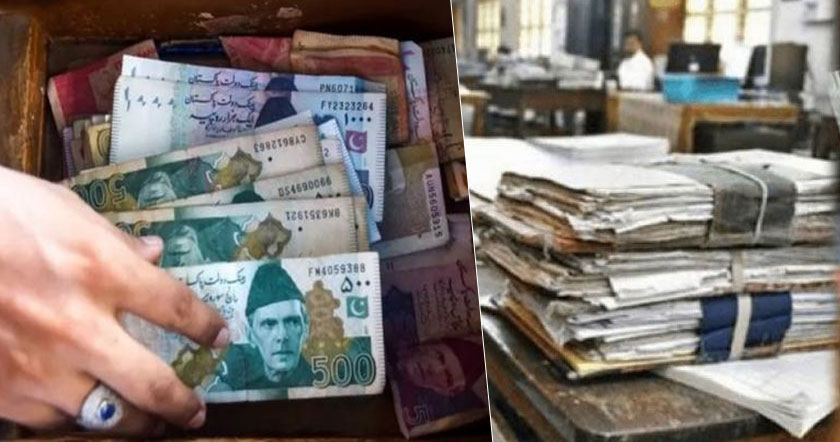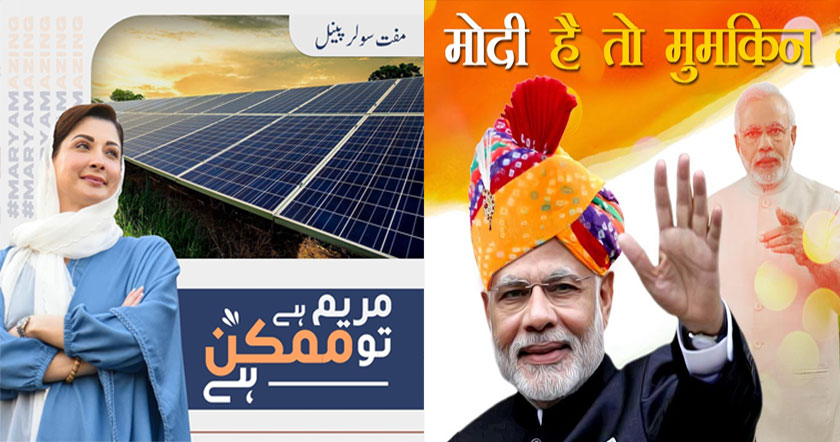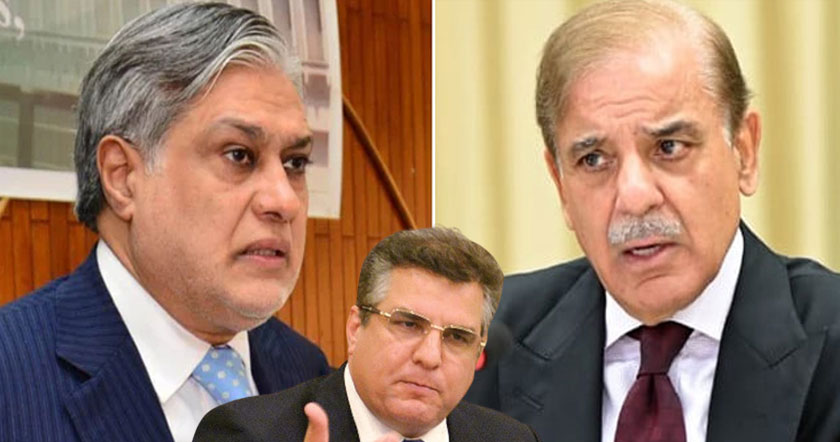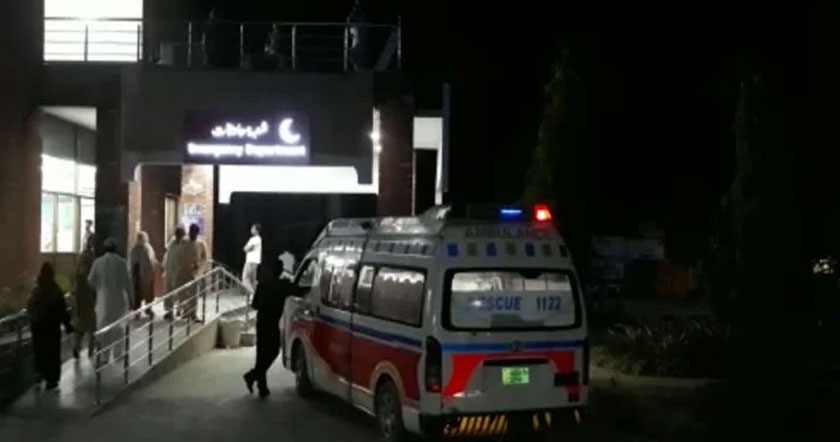Indian water belligerence
Professor Khurram Shahzad
It has been a venerable and established speculation among political experts that the world's future wars will be fought over water, not oil. Where the whole world is fortunately lagging a bit behind for entering into this ill-fated era of 'hydrological warfare', it clearly seems that the subcontinent has perhaps surpassed the rest of the world with Indian courtesy. Now it has expediently forced again the region to slip into a new kind of fracas. Experts say it would be the era in which rivers, lakes and aquifers become national security assets to be fought over, or controlled through surrogate armies and client states.
At its eastern border India has started decanting the rivers irrigating the Bangladeshi plains and deltas. India devices to divert huge quantities of water from major rivers, including the Ganges and Brahmaputra, blocking that water from reaching Bangladesh where it is essential for the rice crop, upon which 80 percent of farmers depend for survival (also mark the current global rice shortage). It will also lead to the drying out of the Sunderbans and consequent destruction of all its rich biodiversity. This water aggression has left the country of rivers with no option but to seek the UN intervention and creation of international water laws to avert this catastrophe it may face in future.
Coming to West, Pakistan has become the victim of Indian hydrological warfare to arrogate its rivers. The construction of Uri Todiam Dam on River Poonch and Kishan Ganga Dam on river Neelum, two tributaries of River Jhelum are about to hit its final stage. Many other small hydel projects had also been completed while paper work has been on track for construction of five more dams; most of them are to be constructed on Pakistani rivers. The work pace on several of these projects prognosticate their completion by 2012 and at that very instant India will be in a position to close down both of these rivers. Consequently, the closure of these rivers would play havoc with Pakistan's agriculture and industry. Furthermore, the inhabitants of these areas inside Pakistan will have to spar the drinking water paucity.
India has also commenced the building of major dam at Kargil on River Indus and it has disbursed $ 200 billion for this purpose. The scenario for Pakistan gets grimmer with further construction of 12 dams on tributaries of River Indus. India was using water of Indus River through a tunnel since long, which also amounts to major water aggression. Interestingly, it has persuaded Afghanistan to originate a water reservoir on the River Kabul, another tributary river of the Indus.
Afghanistan at present utilizes just a fraction of Kabul waters to irrigate about 12,000 acres of land. It plans to construct a dam on the Kabul River and set up the Kama Hydroelectric Project to utilize 0.5 MAF water to irrigate additional 14,000 acres. In connivance with the Jewish lobby India has been maneuvering in war-ravaged Afghanistan where about known 4,000 plus technical workers have been posted in the name of reconstruction. This employs the well-established notion that it has been committing a silent strategic water offence against Pakistan not only from inside but from other neighboring countries.
The Indian water belligerence started when despite signing the 1960 Indus Water Treaty, it invited a bid for the development of a barrage namely Tulbul Navigational Project in 1985. The barrage was to be constructed on the River Jhelum, below the Wullar Lake near Sopore, 25 km north of Srinagar.
For Pakistan, the geo-strategic significance of the site lies in the fact that its protectorate endows India with the means to browbeat Pakistan. A dam on that site has the prospective to devastate the intact system of the triple canal project within Pakistan namely, the Upper Jhelum Canal, Upper Chenab Canal and the Lower Bari Doab Canal.
While India started work on the Wullar Barrage initially, Kashmiri freedom fighters launched their operations that wrecked the machinery and the under-construction dam, which led to India calling off work on the dam and was subsequently resumed at a later stage. It seems that the construction work pertaining to the Wullar Barrage has entered a decisive phase. After this, the Indian government brushed aside five main objections raised by Pakistan relating to the construction of the Baglihar Dam and commenced construction work. The construction of this controversial project violated not only the Indus Water Treaty but robbed Pakistan of its precious Chenab water. New Delhi also opposed any alteration in the design, as recommended by its neighbor.
Pakistanis believe that the height of the dam at 470 feet is disproportionate and will create a reservoir in excess of the power generation needs. The new reservoir potentially could block the flow of the river for 26-28 days during the low season (January-February). It is also contended that a drop of 7,000 cubic feet per second per day in the river's flow to Pakistan will come to pass during this period. The Baglihar Dam together with Dul Hasti and other dams can plainly diminish the flow of Chenab during the vital Rabi crop-sowing season (January and February). The dried crop could spell a disaster to Pakistan's agricultural economy. It has feared that India might also be diverting water to some canals near Akhnor in Kashmir and storing the water in the Salal Dam in Jammu.
In this series of water robberies of its own kind, next comes the Kishan Ganga project on the Neelum River. It enters Azad Kashmir from the Occupied Kashmir at a distance of about 200 kilometers east of Muzaffarabad and travels in a general westward direction. Near Muzaffarabad, the river turns sharply towards south and joins the Jhelum River. This location has been the focus of studies for past three decades for development of power potential of the Neelum River for Pakistan.
A 963 MW hydropower can be developed if the Neelum and the Jhelum rivers were interlinked by constructing a 32 kilometers long tunnel. Blueprints and technical stipulations were finalized in 1997 and Wapda selected this project in 2001 for execution under its Vision 2025. But again knowing the fact that Pakistan has been contemplating a dam on this site, India also started pursuing a plan to divert the Neelum water for its own hydropower generation.
With the apprehension that the Indian plan may ultimately reduce the Neelum water flowing into Azad Kashmir, Pakistan now intends to expedite the implementation of the Neelum-Jhelum Hydro Power (NJHP). By completing the NJHP before the Indian diversion plan, it is hoped India and the international community can be persuaded to accept Pakistan's historic right on the unexpurgated water of the Neelum as offered in the Indus Basin Water Treaty.
With all these hydro-atrocities India is double-dealing by alluring Pakistan in discussion and recommencing with the construction of these dams in tandem. India's scheme is to sway the Kashmiris that by persistently juxtaposing the building of dams in Kashmir, the Pakistani government was negating their right to progress, which is totally against facts. How can the world move towards a future of cooperation rather than conflict on water? One believes that there must be implied some rules internationally to avoid the water conflicts.
Countries must avoid unilateralism in building water reservoirs. Any major upstream alteration in a river system, or increase in use of shared groundwater, should be negotiated, not imposed as in case of Indian water aggression on its neighbors. Governments in the Subcontinent should look beyond national borders to basin-wide cooperation. Building strong river-basin institutions could provide a framework for identifying and exploiting opportunities for cooperation.
In trans-national water disputes, upstream nation is more powerful than the downstream and therefore more cavalier about taking into account downstream needs? That is exactly what the situation is in the Subcontinent. One must also realize the fact that two countries of the region are nuclear powers. And one of them is being kept water stressed by the other. This invites the attention of the keepers of the world to ponder over the situation.
Source: http://www.kmsnews.org/articles/indian-water-belligerence
Professor Khurram Shahzad
It has been a venerable and established speculation among political experts that the world's future wars will be fought over water, not oil. Where the whole world is fortunately lagging a bit behind for entering into this ill-fated era of 'hydrological warfare', it clearly seems that the subcontinent has perhaps surpassed the rest of the world with Indian courtesy. Now it has expediently forced again the region to slip into a new kind of fracas. Experts say it would be the era in which rivers, lakes and aquifers become national security assets to be fought over, or controlled through surrogate armies and client states.
At its eastern border India has started decanting the rivers irrigating the Bangladeshi plains and deltas. India devices to divert huge quantities of water from major rivers, including the Ganges and Brahmaputra, blocking that water from reaching Bangladesh where it is essential for the rice crop, upon which 80 percent of farmers depend for survival (also mark the current global rice shortage). It will also lead to the drying out of the Sunderbans and consequent destruction of all its rich biodiversity. This water aggression has left the country of rivers with no option but to seek the UN intervention and creation of international water laws to avert this catastrophe it may face in future.
Coming to West, Pakistan has become the victim of Indian hydrological warfare to arrogate its rivers. The construction of Uri Todiam Dam on River Poonch and Kishan Ganga Dam on river Neelum, two tributaries of River Jhelum are about to hit its final stage. Many other small hydel projects had also been completed while paper work has been on track for construction of five more dams; most of them are to be constructed on Pakistani rivers. The work pace on several of these projects prognosticate their completion by 2012 and at that very instant India will be in a position to close down both of these rivers. Consequently, the closure of these rivers would play havoc with Pakistan's agriculture and industry. Furthermore, the inhabitants of these areas inside Pakistan will have to spar the drinking water paucity.
India has also commenced the building of major dam at Kargil on River Indus and it has disbursed $ 200 billion for this purpose. The scenario for Pakistan gets grimmer with further construction of 12 dams on tributaries of River Indus. India was using water of Indus River through a tunnel since long, which also amounts to major water aggression. Interestingly, it has persuaded Afghanistan to originate a water reservoir on the River Kabul, another tributary river of the Indus.
Afghanistan at present utilizes just a fraction of Kabul waters to irrigate about 12,000 acres of land. It plans to construct a dam on the Kabul River and set up the Kama Hydroelectric Project to utilize 0.5 MAF water to irrigate additional 14,000 acres. In connivance with the Jewish lobby India has been maneuvering in war-ravaged Afghanistan where about known 4,000 plus technical workers have been posted in the name of reconstruction. This employs the well-established notion that it has been committing a silent strategic water offence against Pakistan not only from inside but from other neighboring countries.
The Indian water belligerence started when despite signing the 1960 Indus Water Treaty, it invited a bid for the development of a barrage namely Tulbul Navigational Project in 1985. The barrage was to be constructed on the River Jhelum, below the Wullar Lake near Sopore, 25 km north of Srinagar.
For Pakistan, the geo-strategic significance of the site lies in the fact that its protectorate endows India with the means to browbeat Pakistan. A dam on that site has the prospective to devastate the intact system of the triple canal project within Pakistan namely, the Upper Jhelum Canal, Upper Chenab Canal and the Lower Bari Doab Canal.
While India started work on the Wullar Barrage initially, Kashmiri freedom fighters launched their operations that wrecked the machinery and the under-construction dam, which led to India calling off work on the dam and was subsequently resumed at a later stage. It seems that the construction work pertaining to the Wullar Barrage has entered a decisive phase. After this, the Indian government brushed aside five main objections raised by Pakistan relating to the construction of the Baglihar Dam and commenced construction work. The construction of this controversial project violated not only the Indus Water Treaty but robbed Pakistan of its precious Chenab water. New Delhi also opposed any alteration in the design, as recommended by its neighbor.
Pakistanis believe that the height of the dam at 470 feet is disproportionate and will create a reservoir in excess of the power generation needs. The new reservoir potentially could block the flow of the river for 26-28 days during the low season (January-February). It is also contended that a drop of 7,000 cubic feet per second per day in the river's flow to Pakistan will come to pass during this period. The Baglihar Dam together with Dul Hasti and other dams can plainly diminish the flow of Chenab during the vital Rabi crop-sowing season (January and February). The dried crop could spell a disaster to Pakistan's agricultural economy. It has feared that India might also be diverting water to some canals near Akhnor in Kashmir and storing the water in the Salal Dam in Jammu.
In this series of water robberies of its own kind, next comes the Kishan Ganga project on the Neelum River. It enters Azad Kashmir from the Occupied Kashmir at a distance of about 200 kilometers east of Muzaffarabad and travels in a general westward direction. Near Muzaffarabad, the river turns sharply towards south and joins the Jhelum River. This location has been the focus of studies for past three decades for development of power potential of the Neelum River for Pakistan.
A 963 MW hydropower can be developed if the Neelum and the Jhelum rivers were interlinked by constructing a 32 kilometers long tunnel. Blueprints and technical stipulations were finalized in 1997 and Wapda selected this project in 2001 for execution under its Vision 2025. But again knowing the fact that Pakistan has been contemplating a dam on this site, India also started pursuing a plan to divert the Neelum water for its own hydropower generation.
With the apprehension that the Indian plan may ultimately reduce the Neelum water flowing into Azad Kashmir, Pakistan now intends to expedite the implementation of the Neelum-Jhelum Hydro Power (NJHP). By completing the NJHP before the Indian diversion plan, it is hoped India and the international community can be persuaded to accept Pakistan's historic right on the unexpurgated water of the Neelum as offered in the Indus Basin Water Treaty.
With all these hydro-atrocities India is double-dealing by alluring Pakistan in discussion and recommencing with the construction of these dams in tandem. India's scheme is to sway the Kashmiris that by persistently juxtaposing the building of dams in Kashmir, the Pakistani government was negating their right to progress, which is totally against facts. How can the world move towards a future of cooperation rather than conflict on water? One believes that there must be implied some rules internationally to avoid the water conflicts.
Countries must avoid unilateralism in building water reservoirs. Any major upstream alteration in a river system, or increase in use of shared groundwater, should be negotiated, not imposed as in case of Indian water aggression on its neighbors. Governments in the Subcontinent should look beyond national borders to basin-wide cooperation. Building strong river-basin institutions could provide a framework for identifying and exploiting opportunities for cooperation.
In trans-national water disputes, upstream nation is more powerful than the downstream and therefore more cavalier about taking into account downstream needs? That is exactly what the situation is in the Subcontinent. One must also realize the fact that two countries of the region are nuclear powers. And one of them is being kept water stressed by the other. This invites the attention of the keepers of the world to ponder over the situation.
Source: http://www.kmsnews.org/articles/indian-water-belligerence



































